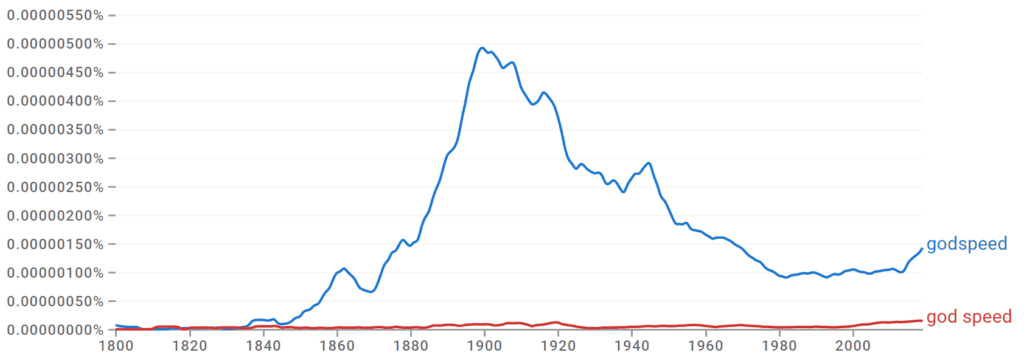Godspeed is a noun that serves as a way to declare good fortune or as a way to wish somebody success. But it wasn’t always used in such a short, secular manner. The word derives from the Middle Ages and has religious roots.
Let’s take a look at the meaning of the word Godspeed, its origins, and how it can be used in speech and writing today.
What Is the Meaning of Godspeed?
The modern word Godspeed derives from the expression “God prosper you,” since speed, or the Middle English version spede, once meant prosperous or a successful course or goal. As a verb, it also meant to achieve a goal, as well as to hasten or hurry.
This use allowed the term Godspeed to translate roughly into modern English as “God hasten or speed you on your way towards success.” It is used to wish somebody good fortune or success, especially when starting a new endeavor or journey.
For example:
- The high school valedictorian concluded her speech by wishing everyone Godspeed in their future endeavors and sentiments of meeting once again in the future.
- Although we were sad and disappointed in our colleague’s decision to leave us, we all wished her Godspeed in her new career.
- As he finished packing the moving van, he looked back at the place he called home for the last decade, wishing there was someone left to wish him Godspeed.
The term, which functions as both a noun and an interjection, is sometimes treated as two words, but the one-word Godspeed is about five times as common in modern writing. The origins of the word were literal in its use of wishing one prosperity granted from the Judeo-Christian God, hence the separation of the words as God speed.
Some publications always capitalize the “G” in Godspeed, and some don’t due to its more modernized, secularized use and acknowledgment by those outside the originating faith.
Godspeed Origins
Speed, or spede, was used in the late 14th century as a verb to mean prosper, succeed or grow rich. God speed, roughly translated as “God grant you success or prosperity,” was often used as a salutation during that time period.
The earliest documentation of the term came from the 1300s in a poem about Sir Tristram in the Auchinlack Manuscript:
“He may bidde god me spede.”
In Chaucer’s The Canterbury Tales, he uses the expression within the first story, The Knight’s Tale, published in 1385:
“God spede yow go forth and ley on faste.”
Shakespeare also made use of the phrase in Richard II, performed in 1597:
“A brace of draimen bid, God speed him wel.”
One of the more recent and famous uses of the phrase was used when Astronaut John Glenn, the first American to Orbit the Earth, was launched into space in 1962. Mission control announced upon the launch, “Godspeed, John Glenn.” The words were repeated by mission control upon his death on December 8, 2016.
Let’s Review
Godspeed can be used as a noun or interjection and originates from the expression “God prosper you.” It is meant to wish a person good luck or success in a new venture or upon their departure on a journey.
It is an old phrase first documented as a variation in a poem dating from the 1300s. Speed, or spede, not only meant to hasten but also represented prosperity or success, and Godspeed was often used as a salutation or greeting among friends.



Comments are closed.